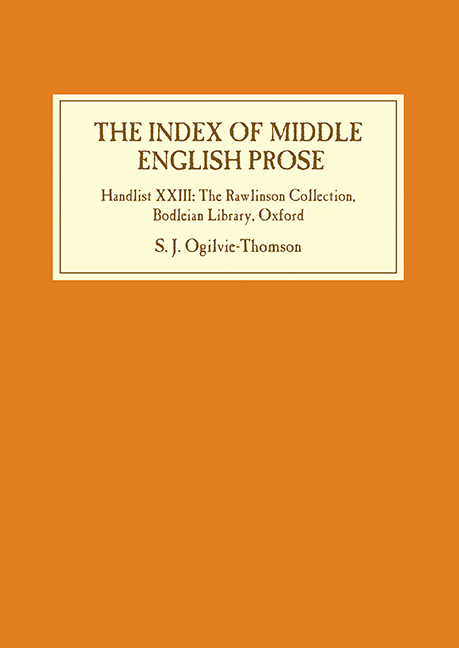 The Index of Middle English Prose
The Index of Middle English Prose Published online by Cambridge University Press: 31 August 2018
The Index of Middle English Prose project was launched at a conference in Cambridge in 1978 on the initiative of A. S. G. Edwards and Derek Brewer. From its inception, the aim of those involved was a publication analogous to Carleton Brown and Rossell H. Robbins's Index of Middle English Verse. But when Brown and Robbins published their seminal volume, more than three decades of manuscript study and indexing lay behind it; the editors, whatever the limitations of their product, had a hands-on knowledge of the materials they presented. At the time when a comparable tool to present Middle English prose was conceived, such work had scarcely begun in this area.
Hence, a number of scholars, working independently, undertook to identify relevant materials on a collection basis. The results of these investigations, a listing of all Middle English prose items uncovered after careful searching, were to be presented in a sequence of stand-alone volumes (or ‘handlists’) published by Boydell & Brewer. The first appeared in 1984, and the present volume is the 23rd in the series. The main body of text in each volume identifies and contextualises, manuscript by manuscript, the Middle English prose material found in a given collection or collections. At the back of the volume are indexes derived from these descriptions, and it is those indexes which will form the basis of the final Index of Middle English Prose.
The IMEP is concerned with material composed between c. 1200 and c. 1500. For the terminus a quo this means as a general rule that if a manuscript is not included in N. R. Ker's Catalogue of MSS Containing Anglo-Saxon, it is considered to be Middle English. In addition we aim to include all later transcriptions of Middle English texts produced before 1750.
There have been adjustments in detail over the years, but the handlists now follow an established format. Each volume contains an introduction with a general account of the history, development and scale of the particular collection or collections described. This is followed by a summary list of the Middle English prose contents of the volume.
The relevant materials discovered in the manuscripts are presented in the order of the shelfmarks of the collection described. Each entry begins with references to published descriptions of the manuscript in question. The Middle English prose items in the manuscript are then numbered and presented in sequential order.
To save this book to your Kindle, first ensure [email protected] is added to your Approved Personal Document E-mail List under your Personal Document Settings on the Manage Your Content and Devices page of your Amazon account. Then enter the ‘name’ part of your Kindle email address below. Find out more about saving to your Kindle.
Note you can select to save to either the @free.kindle.com or @kindle.com variations. ‘@free.kindle.com’ emails are free but can only be saved to your device when it is connected to wi-fi. ‘@kindle.com’ emails can be delivered even when you are not connected to wi-fi, but note that service fees apply.
Find out more about the Kindle Personal Document Service.
To save content items to your account, please confirm that you agree to abide by our usage policies. If this is the first time you use this feature, you will be asked to authorise Cambridge Core to connect with your account. Find out more about saving content to Dropbox.
To save content items to your account, please confirm that you agree to abide by our usage policies. If this is the first time you use this feature, you will be asked to authorise Cambridge Core to connect with your account. Find out more about saving content to Google Drive.